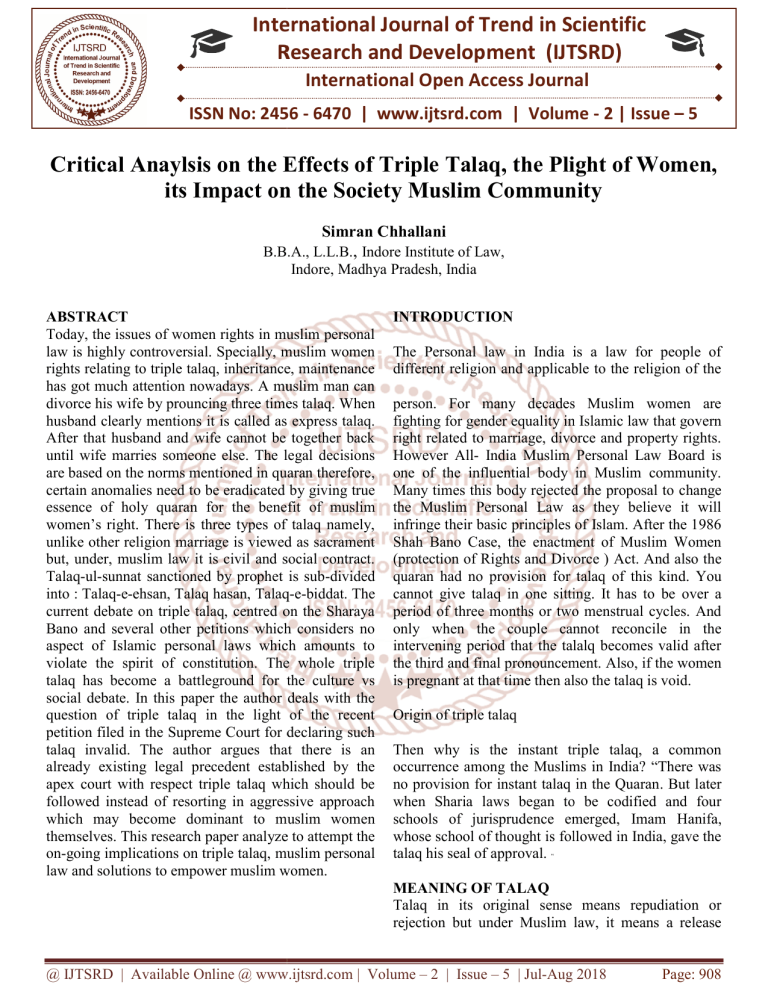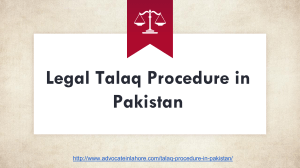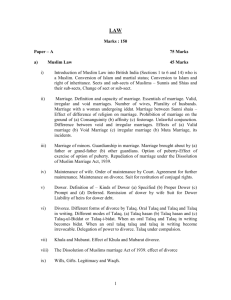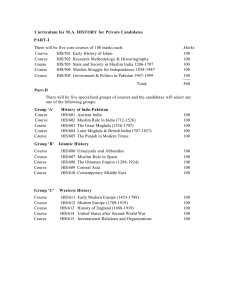
International Journal of Trend in Scientific
Research and Development (IJTSRD)
International Open Access Journal
ISSN No: 2456 - 6470 | www.ijtsrd.com | Volume - 2 | Issue – 5
Critical Anaylsis on
n the Effects of Triple Talaq, tthe
he Plight
Plig of Women,
its Impact on the Society Muslim Community
Simran Chhallani
B.B
B.A., L.L.B., Indore Institute of Law,
Indore, Madhya Pradesh, India
ABSTRACT
Today, the issues of women rights in muslim personal
law is highly controversial. Specially, muslim women
rights relating to triple talaq, inheritance, maintenance
has got much attention nowadays. A muslim man can
divorce his wife by prouncing three times talaq. When
husband clearly mentions it is called as expres
express talaq.
After that husband and wife cannot be together back
until wife marries someone else. The legal decisions
are based on the norms mentioned in quaran therefore
therefore,
certain anomalies need to be eradicated by giving true
essence of holy quaran for the benefit
nefit of muslim
women’s right. There is three types of talaq namely,
unlike other religion marriage is viewed as sacrament
but, under, muslim law it is civil and social contract.
Talaq-ul-sunnat sanctioned by prophet is sub
sub-divided
into : Talaq-e-ehsan, Talaq hasan, Talaq
Talaq-e-biddat. The
current debate on triple talaq, centred on the Sharaya
Bano and several other petitions which considers no
aspect of Islamic personal laws which amounts to
violate the spirit of constitution. The whole triple
talaq has become a battleground for the culture vs
social debate. In this paper the author deals with the
question of triple talaq in the light of the recent
petition filed in the Supreme Court for declaring such
talaq invalid. The author argues that there is an
already existing
xisting legal precedent established by the
apex court with respect triple talaq which should be
followed instead of resorting in aggressive approach
which may become dominant to muslim women
themselves. This research paper analyze to attempt the
on-going implications on triple talaq, muslim personal
law and solutions to empower muslim women.
INTRODUCTION
The Personal law in India is a law for people of
different religion and applicable to the religion of the
person. For many decades Muslim women are
fighting for gender equality in Islamic law that govern
right related to marriage, divorce and property rights.
However All- India Muslim Personal Law Board is
one of the influential body in Muslim community.
Many times this body rejected the proposal to change
c
the Muslim Personal Law as they believe it will
infringe their basic principles of Islam. After the 1986
Shah Bano Case, the enactment of Muslim Women
(protection of Rights and Divorce ) Act. And also the
quaran had no provision for talaq of this kind.
kin You
cannot give talaq in one sitting.
sitting It has to be over a
period of three months or two menstrual cycles. And
only when the couple cannot reconcile in the
intervening period that the talalq becomes valid after
the third and final pronouncement. Also, if the women
is pregnant at that time then also the talaq is void.
Origin of triple talaq
Then why is the instant triple talaq, a common
occurrence among the Muslims in India? “There was
no provision for instant talaq in the Quaran.
Quaran But later
when Sharia laws
aws began to be codified and four
schools of jurisprudence emerged, Imam Hanifa,
whose school of thought is followed in India, gave the
talaq his seal of approval. “
MEANING OF TALAQ
Talaq in its original sense means repudiation or
rejection but under Muslim law, it means a release
@ IJTSRD | Available Online @ www.ijtsrd.com | Volume – 2 | Issue – 5 | Jul-Aug 2018
Page: 908
International Journal of Trend in Scientific Research and Development (IJTSRD) ISSN: 2456-6470
from the marriage tie, immediately or eventually.
Muslim husband who may repudiate his wife at his
own pleasure with or without cause. He can
pronounce the talaq at any time. It is necessary for
him to obtain the prior approval of his wife for the
dissolution of his marriage. One view is that if the
husband was forcibly made drunk, and has
pronounced talaq, such a talaq will not take effect. A
talaq pronounced by a person, in a state of
intoxication or by one laboring under a temporary
stupor fromm the use of some practice, or any other
cause is invalid. Any Sunnni Mohammedan of sound
mind who has attained the age of majority may
divorce his wife whenever he likes by pronouncing
talaq without assigning any cause. The husband may
give talaq by mere words without any talaqnama that
is Oral talaq. A talalq maybe in writing that is called
talaqnama.
Effects of triple talaq on Muslim women:
Imagine living with the mental insecurity that years of
your marital alliance can be ended just by utterance of
three words. The recent practices of talaq being
uttered thrice over telephone, e-mail or letters and text
messages. This innovative mode of divorce is
widespread use by the Muslim men without giving
any plausible explaination to the wives. As a result
divorced wives are left destitute. The miserable plight
of Muslim women are discriminated and shunned by
caprices of personal laws. The struggle a Muslim
women has to face in order to claim maintenance after
divorce especially after the enactment of the Muslim
Women’s Act 1986. The number of impoverished
Muslim women has risen as a result of a rise in oral
divorces in recent times. Many muslim women are
uneducated and cannot provide for themselves, thus
triple talaq only serves to magnify their hardship.
Living as divorced women in a highly patriarchial and
judgemental society like India is very difficult.While
it is important to respect the religious and cultural
minorities in diverse and secular country like India, it
is also critical to ensure that such practices do not
abuse basic human rights. Triple talaq diminishes the
ability of Indian Muslim Women to live with dignity.
Such practices instills fear and anxiety in minds of
countless Muslim women. Since, triple talaq has been
abolished in 22 Muslim majority countries, it is
difficult to see the need to hold on to it. Effective
reforms are necessary and much awaited in the
territory of Muslim personal law.
What is Instant Triple Talaq Bill: The Muslim
Women(Protection of Rights on Marriage) bill,2017?
The Supreme court has already declared this instant
talaq, as unconstitutional on August 22, 2017(Shayara
Bano vs Union of India) this bill is considered to be
historical verdict of Supreme court by making it a
punishable offence. It makes the pronouncement of
“talaq-e-biddat” void and illegal. According to clause
3of the bill,” any pronouncement of talaq by aperson
upon his wife, by words, either spoken or written or in
any electronic form shall be void and illegal”. In
August, this year the Supreme Court had found the
practice of muslim male divorcing his wife by
pronouncing talaq three times, to be illegal and unIslamic. The bill is to protect the rights of married
women and to prohibit divorce by pronouncing talaq
by their husbands. This Act shall come into force on
such date as the Central Government may, by
notification in the official gazette. Titled, the Muslim
Women (Protection of Rights on Marriage) 2017, it
reportedly makes instant triple talaq, a cognizable and
non- bailable offence, punishable with imprisonment
for three years. The law is about justice and respect
for women and is not about any religion or
community. The proposed law would only be
applicable on instant triple talaq and give power to the
victim to approach a magistrate seeking allowance fo
herself and minor children and she retains the custody
of minor children. And this is the most ambiguous
part of the bill, upon which the government was
questioned by opposition in the parliament. 1
Should triple talaq be abolished?
Traces of triple talaq can be found dated back to 1932
in Indian Judiciary from Anisa Khatun’s Case. Finally
after great struggle, with the advent of Shayara bano’s
PIL with 5 other women. “The Supreme Court bench
of five after going through a 397 paged ruling,
declared triple talaq as unconstitutional with 3:2
majority. A study of 2011 census reveals that for
every divorced Muslim women, which depicts the
backwardness and discrimination against muslim
women. “Given that triple talaq was realized to be
unjust and discriminatory against women, many
countries including major muslim countries like
Pakistan, Iran, Jordan, UAE, Turkey, Egypt, etc have
already banned this unilateral form of divorce. The
banning of triple talaq turned out to be so difficult and
1
@ IJTSRD | Available Online @ www.ijtsrd.com | Volume – 2 | Issue – 5 | Jul-Aug 2018
Page: 909
International Journal of Trend in Scientific Research and Development (IJTSRD) ISSN: 2456-6470
controversial in India due to two reasons, firstly, the
muslim personal law. It made the Shariat board as
functional law board for muslim’s personal matters
and prevents state interference. Secondly the article
25 of the Indian constitution gives each the right to
freely practice their religion, which empowers the
personal board and exempts them from falling under
uniform civil code. However article 14 is significant
is balancing the act, making a good case for judicial
activism.
What will be the impact of triple talaq bill in India?
The bill which is made to ensure justice to women,
ridding them of the unilateral divorce, seems to be
getting politicized both by government and
opposition. Whatever might be the political agenda,
the fact that triple talaq bill as a whole remains as a
great success to the secular India pacing way for a
uniform civil code free from patriarchial, orthodoxly
and superstitious beliefs and practices. However, no
law, unless internalized by society can work
successfully, as is evident by cases like dowry-deaths,
caste practices, for which many laws re formulated,
yet the desired result is far from materializing. The
triple talaq bill, though a small but historical step,is a
welcome move towards gender justice in country.
What are the kinds of talaq under Muslim law in
India?
1 Talaq-ul- Sunnat
It may be further sub-divided into : Talaq ahsan,
Talaq hasan.
2. Talaq-ul-Bidaat
Talaq-ul
Sunnat is regarded to be approved form of talaq. It is
based on prophet’s tradition.
Talaq Ahsan
This is the most proper form of repudiation of
marriage. To be in ahsan form, the proceedings of
divorce must satisfy certain conditions. These
conditions are as follows: The husband must pronounce the formula of
divorce in a single sentence.
The pronouncement of divorce must be in a state
of purity;
He must abstain from intercourse for the period of
idaat. Single pronouncement of the civil words of
talaq and sufficient opportunity to the spouses for
reconciliation, are the two reasons for calling this
form as the most “proper’ form of talaq.
Talaq Hasan - This talaq is also regarded to be the
proper and approved form of talaq.In this form too,
there is a provision for revocation. The formalities
required under this form are as under:
The husband has to make single declaration of
talaq in a period of “Tuhr”.
In the next tuhr there is another single
pronouncement for the second time.
The first and second pronouncements may be
revoked by the husband. If he does so, either
expressly or by resuming conjugal relations, the word
of talaq become ineffective as if no talaq was made at
all.
But, if no revocation is made after the first and
second declaration then lastly the husband is to make
third period of purity. As soon as the third declaration
is made, the talaq becomes irrevocable dissolves and
the wife has to observe the required iddat.
Talaq–ul-biddat
The talaq–ul-biddat has its origin in the second
century of the Islamic-era. According to Islamic
scholar this mode of talaq was introduced by the
omayad kings.
It is a disapproved mode of divorce. A peculiar
feature of this talaq is that it becomes effective as
soon as the words are pronounced and there is no
possibility of reconciliation between the parties. 2
Judicial trends: The case of Shayara Bano
The current debate on triple talaq is centred on the
Sharaya Bano and several batches of petitions as well
as Supreme Court own suo moto PIL to consider
whether certain aspects of Islamic personal laws
amount to gender discrimination and hence violates
the constitution. The petition hence challenged the
validity on triple talaq on the touchstone of article 14,
article 15, article 21, article 25 of the constitution. It
states: it is submitted that religious officers and priests
like imams, maulvis, etc. who propagate, support the
practices like talaq-e-bidat, nikaha halala, and
polygamy are grossly misusing their position,
influence and power to subject muslim women which
treats them as chattel, thereby violating their
fundamental rights enshrined in article 14,15,21,25 of
the constitution.
2
www.shareyouressays.com
www.dnaindia.com
@ IJTSRD | Available Online @ www.ijtsrd.com | Volume – 2 | Issue – 5 | Jul-Aug 2018
Page: 910
International Journal of Trend in Scientific Research and Development (IJTSRD) ISSN: 2456-6470
The best example of confrontational politics leading
to actual victimization of the woman in question was
the Shah Bano Case. The case pertained to
maintenance to the muslim wife after talaq had been
pronounced. Shayara bano, a 35-year old woman,
from the state of Uttarakhand, filed a petition in the
Supreme Court, asking for talaq to be declared
unconstitutional. Her husband, a real estate agent
named Rizwan Ahmed,had divorced her by talaq the
previous year. Her petition attracted other parties and
groups that have been demanding a ban on the talaq
practice. 3
Conclusion
Nikah as described in the holy quaran is sacred bond
between man and women and last for the remaining
part of their lives. Before enforcing divorce the couple
is required to stay separately to feel the pain of Zudai
under the monitoring of Qazi. Divorce is the last
undesirable step in the Quaran when all the effort s for
unification go in vein after long presence.
Neverthless, the custom of triple talaq by a husband to
divorce his wife, though not sanctioned in quaran, has
been vogue since th enactment of Muslim Personal
law Act in India.Whatever, the fact may be muslim
men are taking advantage of unlimited freedom of
power in terminating marriage through triple talaq.
Although, some efforts were made to eradicate triple
3
talaq in India. It is therefore suggested that the right
course is to go back to Quaran and sunnah ans seek
guidance from them. Divorce to be legal and effective
must strictly follow the rules of Shariah. Any other
form of divorce which is in conflict with quaran must
be declared a crime. The modern legislation existed in
Africa and Asia, under which no marriage could be
dissolved without the intervention of court. But it is
realistic enough to take recourse to law where
persuation fails to save the pious purpose.
REFERENCES
1. Prof I.A. Khan, MOHAMMEDAN LAW
2. All India Muslim Personal Board
3. Muslim Women( Protection of Rights On
Marriage) Bill,2017
4. Shayara Bano vs Union Of India And Others
5. http://www.shareyouressays.com/knowledge/what
-are-the-kinds-of-talaq-under-muslim-law-inindia/117523
6. Pragti Ghosh, What are the kinds of talaq under
muslim law in India?
http://ili.ac.in/pdf/paper517.pdf
@ IJTSRD | Available Online @ www.ijtsrd.com | Volume – 2 | Issue – 5 | Jul-Aug 2018
Page: 911






